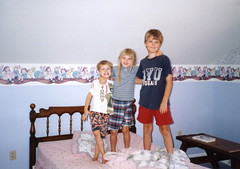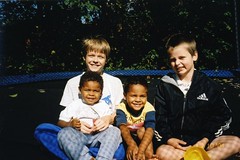As I was talking about our large family dynamic in an e-mail today, and all the high maintenance personalities, and about how I can often rely on various children at different times to help out with each other, it reminded me of a time in my life when I was struggling with feeling guilty about how difficult it might be to grow up in this family. As things like autism came to the forefront, again and again, and more children came into the home, again and again, I started hearing people “warn me” about protecting my more typical children from the hardships of our family’s logistics. “Make sure they have a childhood.” “Don’t make them do too much.” “Don’t forget about them amidst all of your challenges.”
Well, about three or four years after the diagnosis of autism first hit, I remember particularly feeling the guilt and strain and worry over these sentiments. “Was I expecting too much of my more able children?” “Should I protect them from the life they have been given?” “Should I keep them separated from the sometimes harsh realities of our lives?” I was tormented as to my stance about it all. I mean, on the one hand, one of the beauties of choosing to homeschool was to live and love and learn together as a family, yet represented as individuals that we lean on or support, love or hate, be angry at or forgive, etc. I felt the underlying ideal in our home was that we would always strive to work it out together, not against one another, or reject each other. We embraced the opportunities that existed together!
And yet, I had heard stories from people who lived lives that went beyond childhood into adulthood way too early. There was resentment and life choices that resulted from that upbringing. Is that what I was creating? And yet, as I pondered those stories, it was often the product of an ill mother, whether mental illness or physical illness, and the stories often were about the child serving in the role of parent. That’s not what was happening in our home . . .
And then the answer came in an issue of the Reader’s Digest. I wish I could find it to share with you all, but I can’t find what I did with mine (because I distinctly remember tearing it out), and I can’t find it on google. Well, anyway, it was about a family living in Arizona who had at least a son with autism, a typical son and a typical daughter in the picture. If I recall correctly, the three children were home waiting for the parents to return home from work. The boy with autism escaped out the backdoor and directly proceeded to climb one of those huge electrical towers that was not too far from their home. The older, typical brother went running after him, as did the sister. The older brother yelled to his sister to call their parents as he followed him up the tower. As is often the case with autism, the boy had no fear as he climbed higher and higher. The brother, on the other hand, had an intense fear of heights, but he simply kept his eyes focused on his brother, determined to catch up to him.
Well, he finally did, near the very top. By this time, emergency vehicles had been dispatched, and the story leaked to the news, and before long, helicopters were circling above. The older brother gripped the hands of his brother with autism to the tower and tried to keep his attention focused on him as he sang favorite church songs. (The song they referenced made me quite sure they were actually members of our church!) The boy with autism wanted to stim by flapping his arms as he watched the helicopters go by, so it took a lot of effort on his brother’s part. It took many hours in order for the rescue workers to bring them to safety as the tower was too tall for the ladder on the local firetrucks to be effective, so a large power truck was called in. Rescue workers still had to climb a certain distance to reach them and thankfully, both were brought down safely.
Well, naturally, the older brother was lauded as a hero, and he wasn’t really sure how to take it. When asked if he was afraid, he replied that normally he would be, but he tried to keep his focus on his brother instead of thinking about the situation. Another question was asked similar to, “Why would you go after your brother when it was so dangerous?” He matter-of-factly replied, “He’s my brother. I love him. It never crossed my mind not to go after him.” And then the clincher occurred when the article ended with these poignant words, “Are you your brother’s keeper? Of course!”
Well, heritageihc.com purchase levitra online lower level of hormone production can bring erectile dysfunction that is also known as ED.
Well, I all out bawled. YES! This was it! This was who our family was. Why apologize for any of it? Our world today is so caught up in what’s best for me, look out for number one, step on anyone in your way. Family’s are so often caught up in mainstream thinking where everyone is plugged into their own life, duties, and schedule. One reason we chose to homeschool was to embrace “old fashioned values” of family togetherness, developing character, being bored, playing together, working together, looking out for each other, etc. Autism didn’t change that. Difficulties don’t change that. Struggle doesn’t change that. In fact, it should strengthen it!
I would no longer apologize for who our family is . . . and that had to emanate from the inside out. Once I embraced that ideal, that we DO believe in looking out for each other, no apologies necessary, it was easy to move forward with head held high and heart solidly believing in the right thing for us.
We embrace who we are; we honor each other; we are our brother’s keeper 🙂
About 1997; three oldest_________________About 2003; 4 of the 5 youngest



Absolutely beautiful story!
I feel the same way when people express their concerns about the size of our family or our special needs adoption, taking in our grandchildren, or whatever it is they seem to think is making my “normal” children suffer. These concerns are a direct consequence of the selfish “me” generation attitude so prevalent these days.
To give of oneself is a blessing, not a curse. Far from suffering, my children are given many chances to give and receive love. That is what a family is all about.
Great story! I’ve often felt that no matter what, having an autistic brother has only strengthened the sibling bond for my other two. I don’t know how yours are but mine take distinct roles. My daughter is her mother’s child. She’s the caretaker already at the age of 6. My youngest son is the friend or “best pal” as he calls his brother. So many people look at us and shake their heads and comment on how we shouldn’t take the responsibility on as a family, but I just don’t think they “get it”.
Very cute pictures! BTW
Wow, very good post. That really hits home with a lot of stuff I’ve been thinking about lately, thanks! We’ve come across people who just can’t understand why we’d want to be with our children “all the time” and others who think we’re sheltering them. But we love the togetherness! I think homeschooling builds stronger families, I really do!
I’ve met those resentful older siblings too. I’ve come to think that they feel put upon because they realized that the parents were putting a burden on them that wasn’t theirs. In other words, the parents were being selfish. It’s different when the parents are setting the example of love and self-sacrifice; then the kids usually grow up feeling committed to helping out and proud of being needed. At least that’s my theory. I have a medically fragile son so I think about this quite a bit too. The older kids have never expressed or seemed to feel any resentment. We talk about it regularly and I try to make sure they understand that when they “go the extra mile” it is appreciated by their parents and by God.
I feel exactly the same way you do. Unfortunately, my husband wasn’t brought up with this kind of living and I think that he is more stressed about our oldest boy’s autism as a result.
It’s a beautiful post! I’m glad I read it.
This is beautiful!
Great post… You touched on things I’ve also been thinking (and worrying) about. Thank you for sharing your perspective so beautifully…
I think growing up with M and R has mostly been a good and enriching experience for my older kids. It’s given them an empathy, understanding, and acceptance of differences that they wouldn’t have had otherwise.
Thanks for your lovely comment on my blog… I’ve enjoyed reading your blog, I’m glad you found me!
Maura
Pingback: Imperfect Genius » Worth A Thousand Words
I recall reading that article as well and was touched by it. I am an adult and I help care for my sister who is handicapped.
I was 11 when my sister was diagnosed with her handicap and I can still recall my parents coming home with the diagnosis and hearing them say the Dr.’s told them to institutionalize her for the sake of the other children. I was greatly relieved when they went on to say they couldn’t imagine doing so. Maybe some could and in some instances that might be the best choice, but I’m referring back to my 11 year old mind and how horrified I would have been to see my sister moved from us at that point in time.
I think people who warn of how a handicapped sibling might affect those of us other siblings forget to realize these are our sisters or brothers they are talking of. Sure, we know they have handicaps, but that is not the focus of our relationship.
Mary,
The book I reference in my “Special Needs” post had a sibling who reacted in a similar manner when her parents up and took her brother to an institition. She was confused because she couldn’t accept the perspective that she was hearing as to why they did this, particularly from her grandfather, who was the main perpetrator in pressuring this action. She felt her mother had fought the idea for quite some time, until the grandfather jumped all over the time her brother got a little physical with her, although her perspective was not that he had been “physical with her” in the way they were seeing it. He had simply pushed her away, and in her mind, rightfully, but that’s all the grandfather needed to convince her mother to “protect” her daughter.
Anyway, it was a great story about a sibling who felt a lot like you, I think, but was too young to voice any of her own convinctions or perspectives. As an adult as she wrote the book, it was a really interesting read about a sibling’s perspective filtered through her adult ability to give voice.
Thanks for your comment!